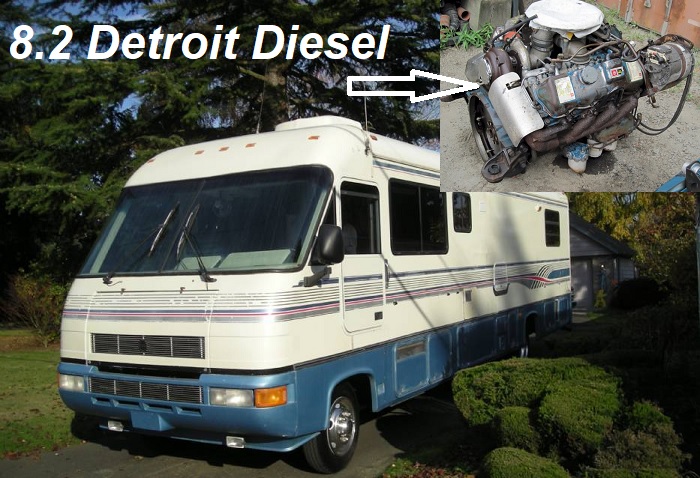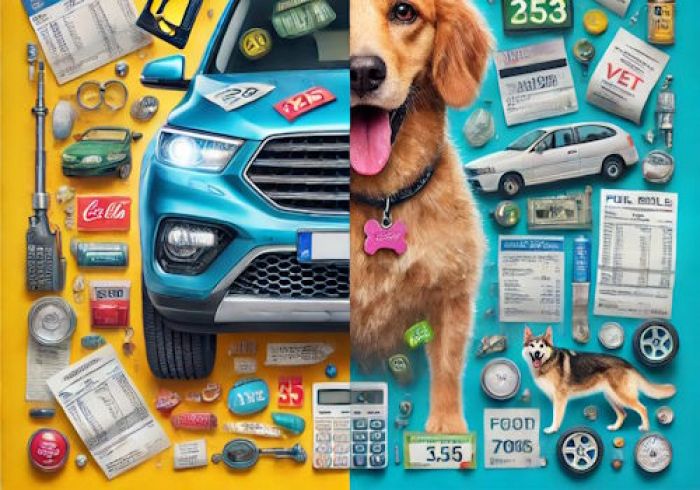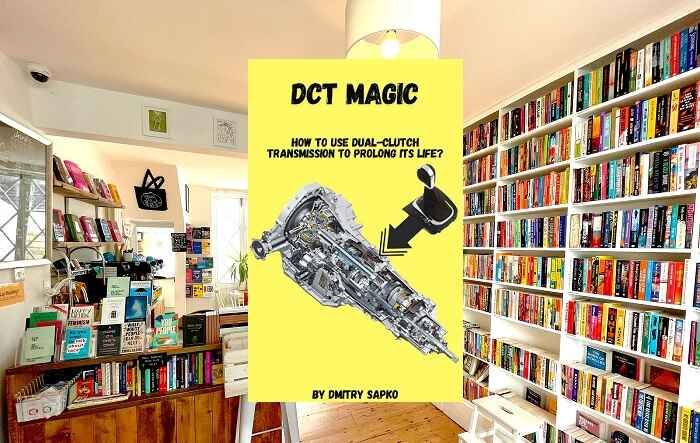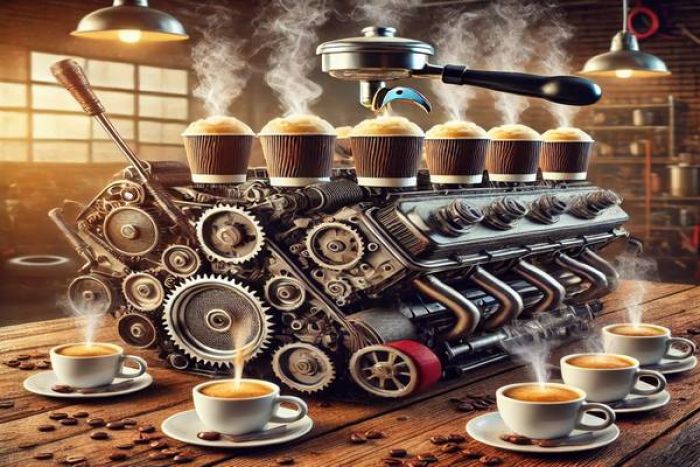Big engines are the philosophy of America in the 1980s. Yes, the companies started to realize that the fuel costs some money, but they still were making big-displacement engines and were offering different technologies to reduce fuel consumption. In the 1980s, the Detroit Diesel Company that belonged to General Motors offered its first 4-cycle diesel engine - it was the 8.2-liter V8 unit.
The huge engine was really a revolutionary technology and something the industry was looking for. This engine appeared to be really nice in terms of fuel economy (at least when you compared it with 2-cycle diesel engines) and torque. So, many corporations took this engine and started building trucks, motorhomes, RVs, vans, buses, etc. using this unit.

Today we'll be speaking about the following:
- Is 8.2 DDC a good engine?
- What can you change and upgrade in this unit?
- Swapping 8.2 Detroit Diesel - what should you choose?
- Main problems of the 8.2 DDC engine.
- The longevity and reliability of the engine.
Let's get started!
How good is the 8.2-liter Detroit Diesel engine?
It depends on what you compare it with. Sometimes, the fans of classic technologies in vehicles call this engine one of the best diesel engines for RVs and trucks. But we don't agree. This engine was actually one of the best ones when it was first introduced in the early 1980s. But now it's an old engine that has quite a lot of problems and really bad maintenance opportunities.
We are going to tell you about the main problems later. But some of them may even make you think about swapping the engine once it hits certain mileage or age. Everything tends to spoil over time, and the 8.2 DDC is not an exception.
Here are some good things we can say:
- this engine is quite reliable and very long-lasting if it gets good maintenance;
- the engine is pretty economical, even though it has 8.2 liters of displacement;
- the torque is big, but we can say that newer 5-liter diesel engines show even better torque;
- later models came with a decent turbocharger and offered 300 horsepower which was not bad;
- this engine was chosen by a couple of marine companies for building their motorboats;
- over 300 000 units were produced between 1982 and 1994, but in 1990 the engine wasn't used in new factory cars;
- the average gas mileage will be around 9 MPG which is not brilliant today.
So, you now see that the engine was good in the 1980s, but it is no longer very good today. It shows quite a lot of arguable pluses but in comparison with today's diesel engines, the 8.2-liter unit is no longer an ideal decision for an RV or a truck.
Because of this, many people are now searching on the internet for what they can do with this engine. For example, some tuning ideas, upgrades, and mods or even swap ideas. Unfortunately, not many tuning ideas come to our minds when we think about this 40-year-old engine, but we have some tips for you to improve the experience with your vehicle.
Some upgrade ideas for basic improvements
Unfortunately, there isn't much you can do with this engine. It's quite old, and even repairing it after some major breakdowns is a very hard task. Finding good parts will not be easy. But the fact that your engine is still alive should make you think that the unit is reliable.
We can think of some upgrades for the 8.2-liter Detroit Diesel engine:
- Turbocharger upgrade. Some first versions of the engine were naturally aspired and only offered 160 and even 130 horsepower which is a shame for such a displacement. That's why you can try with better turbochargers or turbo kits and make your engine much more powerful.
- Better fuel injection. The injectors are known to be one of the problems for this engine, but you can replace them with another system of fuel injection. It's not easy and not cheap, but such a decision will make the fuel consumption much better.
- ECU tuning. Well, not much can be done with the ECU in your 8.2 DDC engine, but some things still can be done. The especially important thing is the MPG. You can increase the gas mileage up to 10 or 11 MPG if you tune the ECU correctly and also ensure that all other engine systems are OK.
- Some settings of your stock turbine. The original turbocharger is not very good in almost all DDC diesel engines. Now, you have much better technologies to set the turbocharger for a better PSI to get more efficiency from your engine. And we don't see the reason why you shouldn't do it.
The key question is the person who is going to upgrade your engine. We know some guys who specialize in diesel engines in RVs and trucks, but we can't give you details because you will consider this as an advertisement. So, what we want to say is that finding such guys will be the best idea for you. They know what to do with an 8.2-liter DDC engine in order to get it on track.
Be careful - any mistakes in your engine upgrade may get you closer to the engine swap!
Ideas for swapping your 8.2-liter engine
Unfortunately, the majority of these engines are too late to upgrade and tune. Most of them are just falling apart because of their age and the number of miles they have gone. That's why a lot of owners are considering engine swap. They usually don't want to buy so big engines again because they want better gas mileage.
You are likely to want something like 5.9-liter Cummins with even better specs or even a smaller diesel engine. Here's why you will want to swap your 8.2 DDC eventually:
- Power - the 8.2-liter engine should give more than 220-300 horsepower. And today, many new engines offer much more power with fewer cubic inches of displacement.
- Fuel consumption. The gas mileage is one of the worst things you get with the 8.2-liter diesel engine. Get a 5.9 Cummins to make it twice better.
- Durability. We don't say that the DDC engine is bad in terms of durability, but it will throw you some minor problems after having completed 100 000 miles or something.
- Maintenance questions. Buying parts for a Cummins is much easier than finding decent parts for a DDC engine.
- Service costs. One example - for setting the fuel injection system in your 8.2-liter DDC engine you are likely to pay about $750. The same action for Cummins will cost twice less.
When you are about to swap your 8.2-liter Detroit Diesel engine, you will not be glad to consider just buying another Detroit Diesel engine. You will want to swap it with something more powerful, more economical, and less problematic.
We believe, Cummins is the best option. But of course, you may look at some other GM or Ford engines. You can fit nearly everything in the engine compartment because the 8.2-liter unit is quite big. But think about the transmission. Usually, 8.2-liter DDC comes with Allison 4-speed transmission. It will not be good for any other engine, and you will have to swap the transmission, too.
What are the problems and average longevity of the 8.2 Detroit Diesel?
The longevity question is pretty important. A lot of owners will agree that the Detroit Diesel engine is very long-lasting. Some trucks and RVs have been using this engine for 300 000 miles or something. But, on average, the longevity is not that good. It's described as 150 000 miles because after that mark the engine starts showing problems like oiling issues, turbocharger issues, fuel injection issues, etc. And all these issues may cost you a fortune to repair.
So, the longevity is thought to be anywhere between 150 000 and 200 000 miles. After that, you should think about a thorough repair with head repair, piston rings replacement, or you should just swap the engine to some other type.
We think that poor gas mileage is one of the biggest problems. Also, the engine will often bother you with minor issues and problems that may cost a lot to repair. Sometimes, the maintenance costs will be so high that the swap will seem a very nice alternative to repair.
Final words
We know that there are still many fans of the 8.2 Detroit Diesel engines. These engines are wonderful in terms of torque and durability. But we've found a lot of things that will spoil your mood when you own a vehicle with this engine. A lot of minor problems will shorten the longevity of the engine and will make you spend more money as the unit gets older.
You may upgrade some parts of the engine like the ECU, turbocharger, fuel injection system. But you will still not get better gas mileage and much better specs. So, many owners of RVs and trucks with these engines prefer swapping them to some other, more up-to-date, units.
About the authors
The CarAraC research team is composed of seasoned auto mechanics and automotive industry professionals, including individuals with advanced degrees and certifications in their field. Our team members boast prestigious credentials, reflecting their extensive knowledge and skills. These qualifications include: IMI: Institute of the Motor Industry, ASE-Certified Master Automobile Technicians; Coventry University, Graduate of MA in Automotive Journalism; Politecnico di Torino, Italy, MS Automotive Engineering; Ss. Cyril and Methodius University in Skopje, Mechanical University in Skopje; TOC Automotive College; DHA Suffa University, Department of Mechanical Engineering






Add comment